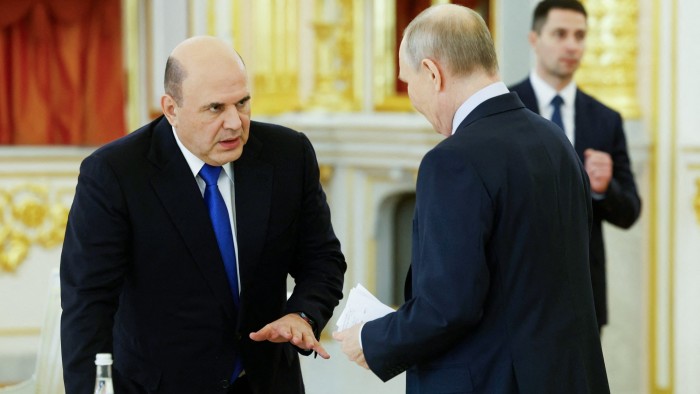Physical Address
304 North Cardinal St.
Dorchester Center, MA 02124
Physical Address
304 North Cardinal St.
Dorchester Center, MA 02124

Digest opened free editor
Rola Khaleda, FT editor, chooses her favorite stories in this weekly newsletter.
Russian officials believe that Western pressure impedes Moscow’s efforts to attract the former Soviet countries to its orbit and build economic relations with the global south, according to a leaked government report.
The internal presentation, which appears in a strategic session led by Prime Minister Mikhail Michigan, last April, provides a rare view on how Russia’s war in Ukraine with some of its closest allies.
The analysis is significantly recognized that the pressure of Western sanctions, as well as economic initiatives, has succeeded in leading a wedge between Moscow and some of its closest commercial partners.
The Cabinet Russia presented the report to dozens of senior government officials and senior executives in some of the largest state companies in Russia, according to its website. Sugical experts such as Sergey Karaghanov, who called on Putin to use nuclear weapons against Europe, also attended Alexander Dugin, a supporter of radical violence against Ukrainians.
The report says that Moscow’s ambition is to restore its access to global trade by placing Russia in the center of a European commercial bloc aimed at competing with the United States, the European Union and areas of economic impact in China.
Russia sees “Macroregion” as a long -term important project, which would last with any talks with the West on the future of Ukraine, to help strengthen its feet on the “global scene”.
The new bloc will link Russia to the global south by granting each side the possibility of access to raw materials, developing financial relations and transportation, and unifying them through “a common global point of view (…) where we write a ruling for the new world (and we have our sanctions policy”, The report claims.
But he admits that the obstacles that prevent the return of global Russia are still great. The report says that Western countries have successfully threatened the Central Asian countries by compliance with the sanctions through the “islands and sticks” approach while granting access to global markets, transportation corridors and supply chains that go beyond Moscow.
Meanwhile, Russia’s allies benefited from sanctions by removing Russian companies from their jurisdiction, controlling import and export flows, and transferring production from Russia, according to the report. He adds that Central Asian countries have also requested additional commissions to compensate for the risk of violation of sanctions.
The report admits that Russia will have to “play the long game” to preserve the Central Asian countries in its orbit. It indicates that Moscow appeals to its common history and respects its independence, while understanding the Russian victory in the war against Ukraine will not be sufficient to end the pressure on Western sanctions. “The close relations with a country (like Russia) will be a source of difficulties,” the report says.
He adds that Central Asian countries benefit from “the weakness” of Russia and look forward to “integration without Russia” in groups such as the organization of Turkish countries. The nations have changed their global point of view “by” rethinking our collective history “, encouraging English as a second language instead of Russian and moving to Western educational standards, as well as sending their elites to be taught in the West.
The report concluded that the countries will have to “decide on their position towards Russia.”
Kazakhstan, the largest economy in the region, condemned the invasion, refused to recognize the regional gains of Russia, and made an effort to show compliance with Western sanctions. However, the neighboring Kyrgyzstan has threw a lot firmly with Russia and appeared as an important way to alleged sanctions.
The report highlights Belarus as more likely to be a successful for Russia, comparing the invitation of powerful president Alexander Lukashenko to diversify economically from Russia in 2018 with his announcement six years after “we will always unite with Russia.”
But the development of the Moscow -led European Economic Union, which includes Belarus, Armenia, Kazakhstan and Kyrgyzstan, is also struggling with “regular problems”, according to the report. These risks include sanctions, the use of various payment systems after Western countries have launched Russia from the rapid correspondence system, and to control the currency that Moscow provided to help overcome the impact of sanctions.
A Mishustin spokesman was contacted to comment, but he did not respond.